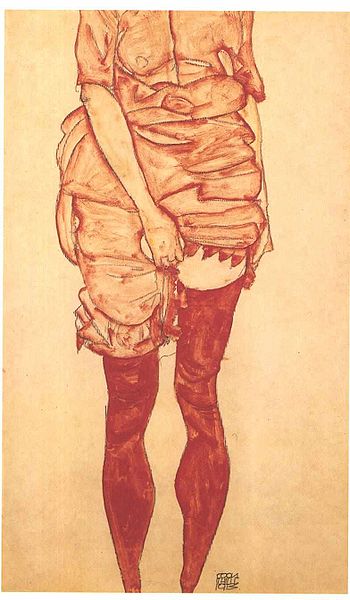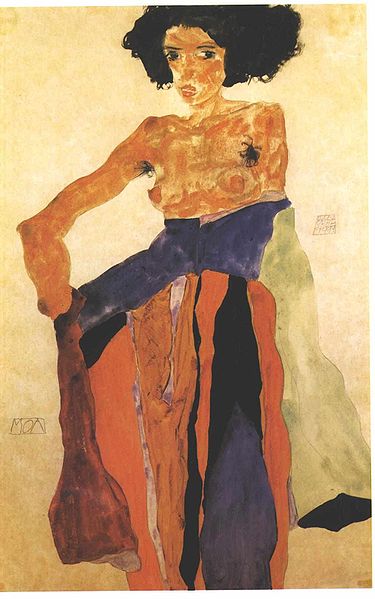.
You appeared at the gate
In a red dress
To tell me you are the flame
That consumes and yet still burns
Again
A thorn from your carmine
Rose has pricked my finger
So that I may taste my blood, as I have yours
Loitering at the end of that street
That tears the sky
Apart from within
Long ago I knew
Age ripping open its heart for love
Could only lose
That was on a Monday
To hold hands
And talk pleasantly
We could find refuge only
In a sad garden
Of the convulsive city
In a red dress
To tell me you are the flame
That consumes and yet still burns
Again
A thorn from your carmine
Rose has pricked my finger
So that I may taste my blood, as I have yours
Loitering at the end of that street
That tears the sky
Apart from within
Long ago I knew
Age ripping open its heart for love
Could only lose
That was on a Monday
To hold hands
And talk pleasantly
We could find refuge only
In a sad garden
Of the convulsive city

Nude with orange-red cloth: Egon Schiele, n.d.
12 Settembre 1966
Sei comparsa al portone
in un vestito rosso
per dirmi che sei fuoco
che consuma e riaccende.Una spina mi ha punto
delle tue rose rosse
perché succhiasse al dito,
come già tuo, il mio sangue.Percorremmo la strada
che lacera il rigoglio
della selvaggia altura,
ma già da molto tempo
sapevo che soffrendo con temeraria fede,
l’età per vincere non conta.Era di lunedì,
per stringerci le mani
e parlare felici
non si trovò rifugio
che in un giardino triste
della città convulsa.

Standing woman in red: Egon Schiele, 1913
Giuseppe Ungaretti: 12 Settembre 1966 (12 September 1966) from Dialogo (Dialogue), 1968: translated by TC

This poem comes from a collaboration with the young Brazilian poet Bruna Bianco: Ungaretti's nine love poems are his part of the "dialogue", counterposed with Bianco's five "response" poems.
ReplyDeleteIn his late seventies, in October 1966, while on a trip to Sao Paolo to receive an honorary degree, Ungaretti attended a poetry conference, where he met and fell in love with one of the other poets at the conference, Bianco, a twenty-six-year old Italian-born law student from a Croatian family.
He rediscovered in her, as he would tell her in a letter, mio vivente amore di Poesia.
He returned twice to Brazil and over the next few years exchanged hundreds of letters and many poems with her. She visited him in Italy, and asked him to return with her to Brazil to live. He declined.
("He never even touched my knee," Bianco, who would carry on with a law career in Sao Paulo, marry and have three children, would later avow.)
Dialogo was issued hors du commerce in an edition of eighty copies on the occasion of Ungaretti's 80th birthday.
The story of the late-blooming love poems of the aged widower (Ungaretti's wife of thirty-eight years, Jeanne Dupoix, had died in 1958) took a further turn in 1996 with the publication of an article by Sebastian Grasso in Corriere delle Sera, revealing evidence that after a five-year "dry spell" in which the poet had written nothing, his renascent emotions had sparked poems which, in the process of composition had drawn freely upon poems by other poets: Eliot, Quasimodo, Hikmet and, in particular, James Joyce's Pomes Pennyeach, from Chamber Music.
Before his death Ungaretti himself had quietly admitted that both the love affair and the poems had been desperate -- and doomed -- attempts to resist the inevitable. In 1969 he told his correspondent that his love for her still burned, but now only from "beneath the ashes".
I love that story...so romantic! thanks Tom!
ReplyDeleteGOOD 'stuff', TEE SEE
ReplyDeleteand I 2oo every time I go to a poetry [thing] fall in Love with a new "what's her name"! in phacht
every time I go to the grocery store
I come away
I guess re: Bianco
Ungaretti
was "in it" for the poetry
just as Egon Shiele was "in it" for the art ...
met my "original muse"
(my newest 'muse' now in 2010 is 34 I am 70. when I told her that she was my "muse" she replied (pissed off) "OH, SO I AMUSE YOU?")
in 1969... last time I saw her (my Original
was in 2003!
and
my love for her still burns
beneath the ashes an Old Hag
but
in the Traditional Way!
Ed
Please excuse the monosyllabic response, but all I could think was "Wow".
ReplyDeleteReading 12 September 1966 along with seeing each of the Schiele's, the story behind the poem isn't at all surprising. It clearly presents itself and "Wow".
At the end of this static, somewhat frustrating day, it was as though a powerful force swept through the room where I'm sitting.
Yes, I too have been pondering this poignant tale, especially in light of having been present at a private gathering of poets for Ungaretti during a brief visit he made to New York at the time of this great last love.
ReplyDeleteHis private secretary of that time has later recalled that after getting back from the first trip to Brazil, he threw away his cane and appeared elated, "rejuvenated".
He certainly seemed young at heart on the evening of Ed Sanders' fundraising event for FUCK YOU: A MAGAZINE OF THE ARTS. Those at the event were invited to donate a sprig of pubic hair; the harvest would be collected in an envelope, the envelope signed by the donors, and sold to a local dealer in literary rarities.
Though he was then probably three times the age of almost everybody else who contributed, Ungaretti voluntarily -- and gleefully -- participated in this charity endeavour.
Tom,
ReplyDeleteGreat story about Ungaretti at that gathering in New York, contributing a hair to the cause -- and yes too, for me too, how moving the story 'behind' this poem (next to these Schiele paintings) . . . .